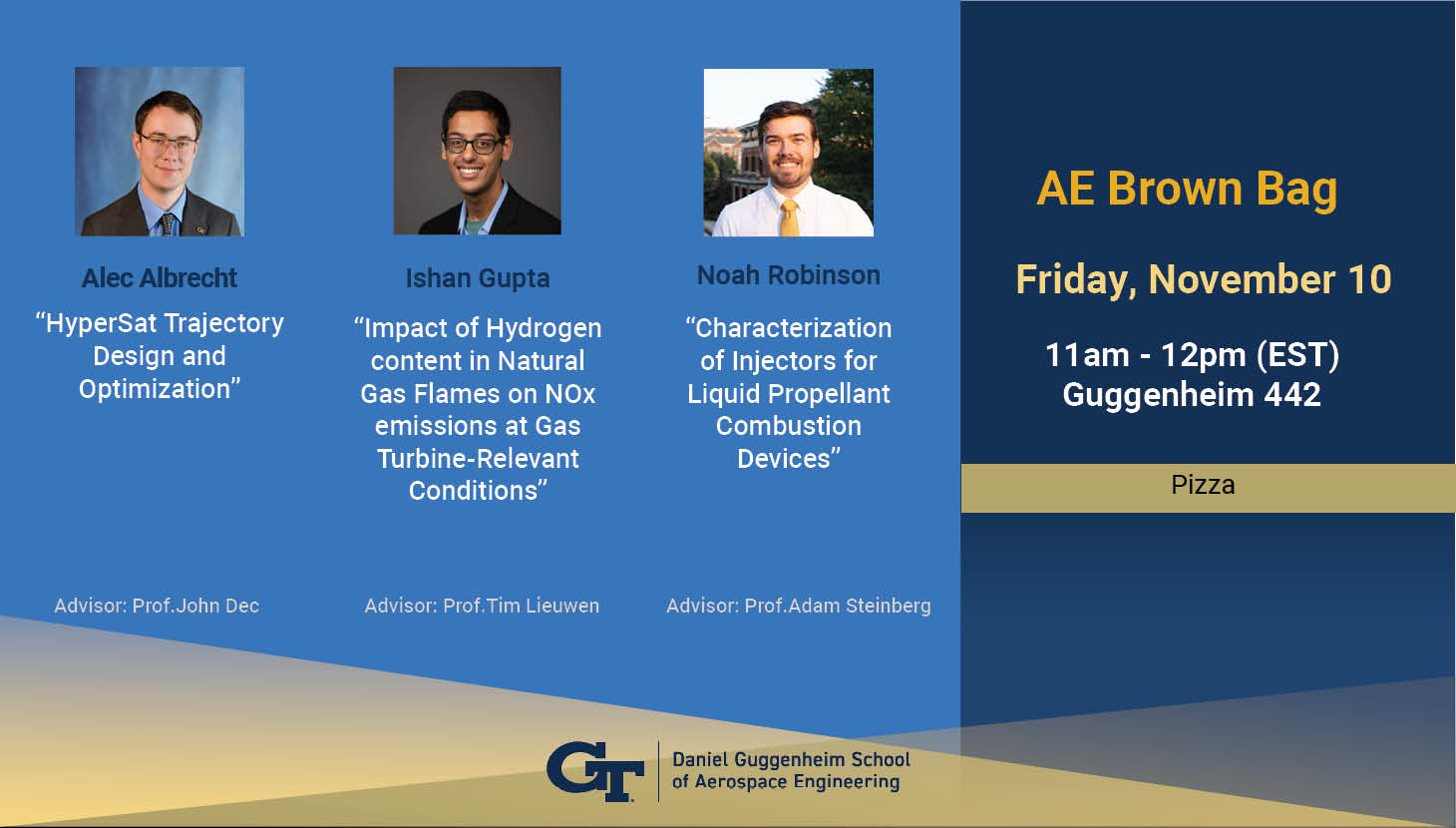
Brown Bag Seminar
Friday, November 10
11:00 a.m. -12:00 p.m.
Guggenheim 442
Pizza will be served
Presenters
Alec Albrecht
Ishan Gupta
Noah Robinson
Alec Albrecht
Title:
HyperSat Trajectory Design and Optimization
Abstract:
The hypersonic flight regime is a notoriously difficult region to obtain reliable test data. Most means of obtaining test data are incredibly expensive, often have long lead times, and require considerable support efforts. The HyperSat mission is a joint venture between the SSDL and GTRI that will provide a hypersonic reentry test platform while also training emerging leaders in hypersonic and reentry engineering. This research focuses on the trajectory design of the first mission, which includes a series of aerobraking passes instead of direct reentry. Trades were conducted to determine the best orbit to meet these requirements, and to characterize the number of ground stations needed for data downlink after each pass, including a feasibility study on whether the Georgia Tech ground station alone can meet this requirement.
Advisor:
Professor John Dec
Ishan Gupta
Title:
Impact of Hydrogen content in Natural Gas Flames on NOx emissions at Gas Turbine-Relevant Conditions.
Abstract:
The formation of oxides of nitrogen (NOx) emissions is of particular importance due to regulatory, industrial, and environmental concerns. Experimental work was conducted to determine the impact of Hydrogen content in H2/Natural Gas fuel blends on NOx emissions at gas turbine-relevant conditions. Recent data and calculations suggested that NOx emissions can be substantially elevated from hydrogen combustion. However, this data generally does not control for flame temperature and premixedness. As such, a key goal of this work is to obtain data in the perfectly premixed limit for a range of H2/Natural Gas fuel blends while maintaining a constant flame temperature. Recognizing the different kinetic sensitivities of NOx production to processes occurring within the flame and post-flame regions, special care was also made to differentiate between the regions. A combustion vessel capable of 30 bar operation was constructed and NOx emissions were intrusively measured using a gas analyzer connected to a water-cooled probe. Hydrogen, Natural Gas, and air were precisely metered in order to hold adiabatic flame temperature constant during the duration of a test condition. Experiments were conducted at firing pressures of 5 bar and 2.5 bar, using Hydrogen fuel percentages of 30%, 50%, and 70%. The results showed that NOx emissions marginally increased at higher hydrogen fuel content for a constant adiabatic flame temperature. Furthermore, it showed that the formation rate of NOx in the post-flame region also experiences marginal increases with higher hydrogen content at a constant adiabatic flame temperature. A set of companion chemical kinetic calculations was also performed, with an important outcome being recommendations for NOx reporting best practices.
Advisor:
Professor Tim Lieuwen
Noah Robinson
Title:
Characterization of Injectors for Liquid Propellant Combustion Devices
Abstract:
Injectors are a key element of any jet or rocket propulsion system, as adequately mixing propellants is crucial to their performance. An injector's true combustion efficiency can only be evaluated through a hot test with its engine, but these are often risky to hardware, time-consuming, and expensive. This project seeks to characterize the relative performance of an injector through testing with water and un-combusted fuels to minimize the number of hot tests needed to optimize an engine. Georgia Tech's Yellow Jacket Space Program student organization will use this to take a more scientific approach to the design of their liquid bipropellant rocket engines. Additionally, researchers at the Ben T. Zinn Combustion Laboratory will use this to characterize their own fuel injection systems. This presentation will detail the design of the rig and the methods that will be used to characterize injector performance.
Faculty Advisor:
Professor Adam Steinberg